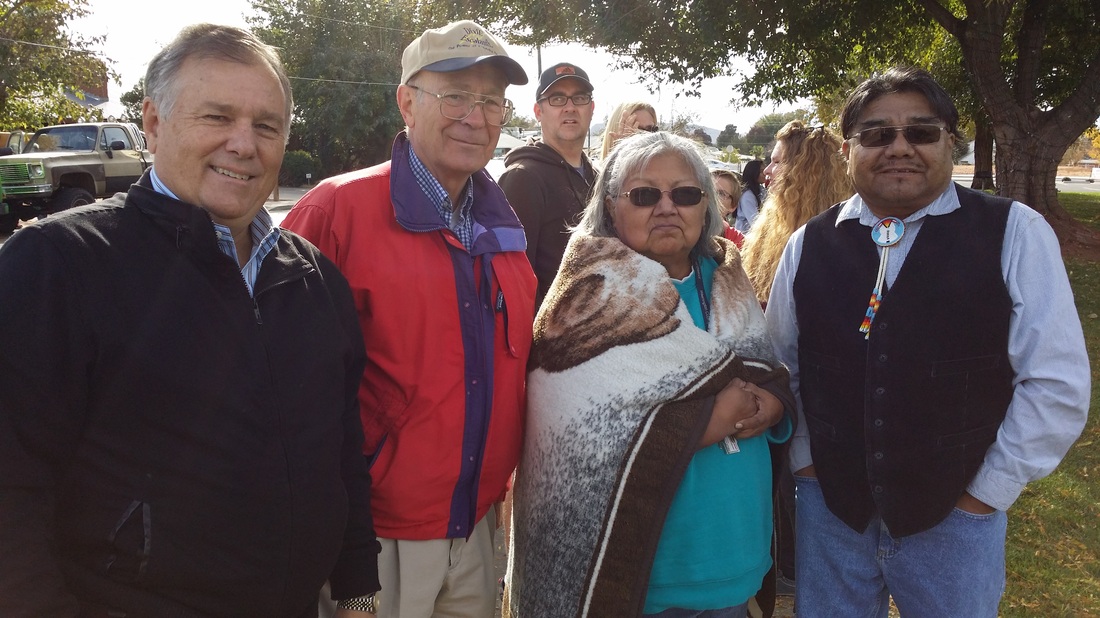One Native American framed the gathering best. He told how the Mountain States are described as the “suicide belt” of the U.S. and Indian reservations have even higher suicide rates. So sobering.
Glenn Rogers, a council member of the nearby Shivwits Band of the Piute tribe, told how his 27 year old son died from suicide. He showed the Shivwits Band staff that was about his height. It contained eagle feathers, buffalo fur, and buckskin. Among the other significances, he said the staff is a memorial to his son.
Benn Pikyavit of the Kaibab Band of Paiutes said he also lost a son to suicide. I recall that a couple of years ago Ben was Becky and my tour guide through Pipe Springs National Monument that lies within his reservation. At today’s event, he performed a smudge ceremonial prayer. He burned sage in a small pot, walked slowing around the large circle of participants, and fanned each individual with smoke using eagle feathers.
We walked about a half-mile to a Washington City recreation center meeting room where there were more speeches along with Native American dances and songs. I was especially impressed with the spoken words of Nicolette Parrish of the Dixie State University Native American Student Association. She told how American Indians must constantly defend their identity. They must balance two worlds. They have to know George Washington and Crazy Horse, Abraham Lincoln and Geronimo. They must speak English and their native language.
Nicolette was good enough to share with me a copy of her prepared remarks so I can quote some of what she said:
“Today we came together to celebrate our lives and to give thanks to our ancestors who have fought and thank those who continue to fight for us today. As American Indians resiliency is in our blood. As a people, we have dealt with genocide, social ostracism, and cultural persecution for 500 years. That means for 500 years there have been multiple attempts to eradicate our culture, our tradition, and our spirits. But as a people, we have prevailed. We have been fighting for 500 years. Why stop now?
“As I mentioned earlier, we live in a tough society. Everything around us is set up for us to fail. Coming from an underperforming reservation school, single parent household, an alcoholic father, I had the odds stacked and they were not in my favor. I grew up on the Navajo Reservation. I had never spent more than three weeks off the reservation. When I stared college I had to adapt to a whole new world. I would like to say my transition was an easy one, but it wasn’t. The friends I had did not understand who I was or my values—therefore I could not make meaningful connections.
“So whenever you go out and do something, remember you have all of Indian country and 500 years of history behind you. And when you feel alone, please remember my brothers and sisters, I promise to fight for you and fight with you. So let’s tighten our moccasins and continue to fight together. We got this!”
I feel overwhelmingly impressed with Nicolette’s sense of self, healthy pride in her great heritage, and her determination to help her people.
With great leaders like Nicolette and others that I met today, surely the Paiute and Navajo people will succeed—including reducing their rates of suicides. I expect they will set the example for the rest including us “Anglos.”
[i] http://www.thespectrum.com/story/news/local/2014/11/23/native-americans-others-take-part-spirit-walk-raise-awareness-suicide/19435803/


 RSS Feed
RSS Feed
